Nice work. That's a very interesting situation that you've gotten yourself into. Now that you are even futher away from home than when the kingdom fell apart, you're now at a safe distance from which to plot your revenge

The Fall of the Kingdom of Poland
- Thread starter phargle
- Start date
-
We have updated our Community Code of Conduct. Please read through the new rules for the forum that are an integral part of Paradox Interactive’s User Agreement.
You are using an out of date browser. It may not display this or other websites correctly.
You should upgrade or use an alternative browser.
You should upgrade or use an alternative browser.
My first approach was to remain in Poland and work to rebuild it. Like Veldmaarschalk said, it seemed interesting, but everything happened too fast and I basically achieved my goals. Then I noticed that Bajoras was my heir, and after him . . . some Bohemian guy. That gave me the idea, to paraphrase Nikolai, to rise and fall and rise and fall.
I had Bajoras killed just to be sure, and then gave my marshal a lot of land and declared elective law. We recreated Poland, used some cheats to kill off all the Piasts but one line, and then used byzantine to make sure Bolko Piast got Roma but gave up the rest of his land. I also used it to make sure the kingdom stayed in one piece until I could reload, since the coup, restructure and wars guttered my reputation. angryclown hits the nail on the head. This is a more interesting situation that will force me to take the long view on revenge. I will go with Pablo Sanchez's idea to take revenge on those who have wronged the Houst of Piast: the von Frankens, the pope, and Bolko Brochwicz.
Two of you noted two things. Specialist920, I am once again a vassal of the HRE, but this time I'm a one-province count in Italy. And Murmurandus, I do not know if the Bolko wars will come because King Bolko might be overthrown long before I get to him. We'll see.
Thanks for the suggestion on breaking it again, coz1.
Thanks for reading, stnylan and Stroph1 - oh, and Stroph, I fixed the font. Hope it's better.
Oh, and nothing can stop the Knuds, EvilSanta. I have some thirty updates already screencapped and another dozen or so I can do if there's interest after the game gets boring.
I had Bajoras killed just to be sure, and then gave my marshal a lot of land and declared elective law. We recreated Poland, used some cheats to kill off all the Piasts but one line, and then used byzantine to make sure Bolko Piast got Roma but gave up the rest of his land. I also used it to make sure the kingdom stayed in one piece until I could reload, since the coup, restructure and wars guttered my reputation. angryclown hits the nail on the head. This is a more interesting situation that will force me to take the long view on revenge. I will go with Pablo Sanchez's idea to take revenge on those who have wronged the Houst of Piast: the von Frankens, the pope, and Bolko Brochwicz.
Two of you noted two things. Specialist920, I am once again a vassal of the HRE, but this time I'm a one-province count in Italy. And Murmurandus, I do not know if the Bolko wars will come because King Bolko might be overthrown long before I get to him. We'll see.
Thanks for the suggestion on breaking it again, coz1.
Thanks for reading, stnylan and Stroph1 - oh, and Stroph, I fixed the font. Hope it's better.
Oh, and nothing can stop the Knuds, EvilSanta. I have some thirty updates already screencapped and another dozen or so I can do if there's interest after the game gets boring.
Excellent. Good to know we will be seeing more of the rise...and fall...and rise...and then fall of Poland and the Piasts.  Inspired gaming and storytelling, sir.
Inspired gaming and storytelling, sir. 
and Stroph, I fixed the font. Hope it's better.
Thank you very much!
Bolko's recovery.
In 1131, Bolko had a tattered reputation and very little land. For two years, raising his son Lambert and the birth of his next two sons distracted him from affairs of state, but by 1133 he was ready to restore his fortunes. Claims were engineered against the independent counties of Napoli and Salerno, and by 1135 both provinces had been conquered. For his accomplishments, Bolko was made duke of Campania by the emperor.
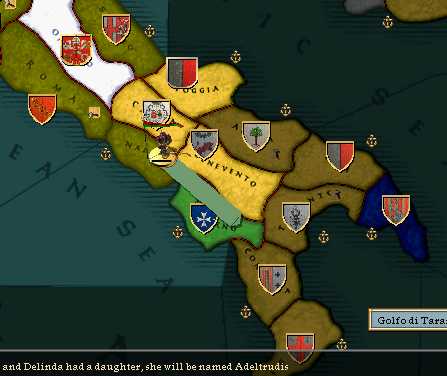
Bolko relied heavily on his brothers during the early years of his reign. One brother, the selfish and arbitrary Jacek, encouraged Bolko to secure his position by purging all outsiders from the court. Between 1136 and 1140, a dozen courtiers were executed and Jacek was declared Bolko's heir. One courtier, the Prussian Betten of Marienburg, claimed Bolko fathered her son. She was killed and Pawel was adopted by the duke. The most significant event of this purge was the marriage between Jacek and the sister of the duke of Apulia. This union between the House of Piast and the de Hautevilles would prove important later on.
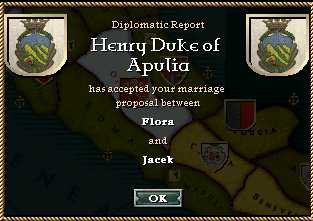
The purge weighed on Bolko's soul, and in 1141 he was called upon to atone for his crimes. He chose to purify himself through a crusade and sailed for Sicily in 1142. By September, he was eight hundred ducats in debt but had secured a landing at Trapani. The Muslim half of the island was conquered steadily and Jacek was dispatched to secure the conquest.
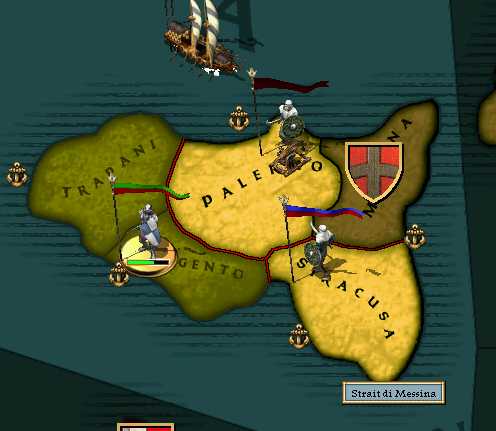
The union between Apulia and Campania continued to grow with the birth of Waclaw, third in line to become duke of Apulia. Bolko believed that God had forgiven him for his sins, and prosecuted his crusade with renewed zeal. Bishop Dobromir was sent to convert the Muslims of Agrigento, while Bolko himself sailed against the Hammadids in Sardinia. Neither venture proved successful; Trapani collapsed into anarchy in 1145, while Emperor Gerolamo usurped Bolko's conquests.
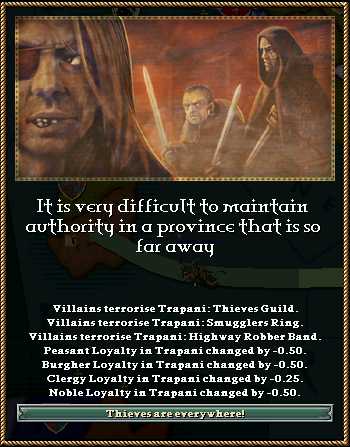
Not wanting his expedition west to be in vain, Bolko continued on to the Muslim islands of Mallorca and Menorca. Both islands were conquered within the year. Young Lambert accompanied his father on this crusade, but he failed to learn from Bolko's tough and determined example. Instead, Lambert developed a reputation as a violent and misguided warrior. Another son, Leszek, was rumored to have fathered a child with a servant and was ordered to confess his sins. Bolko continued to be vexed by his many sons.
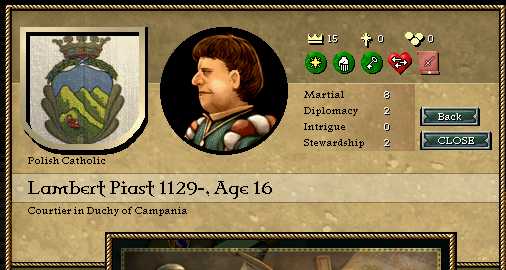
The frustrated Dobromir rebelled in 1147 and was quickly crushed. Many of the Italian soldiers chose to stay in Sicily, and by 1149 Trapani had become majority Christian and Italian. This added to the triumph of barely a year before when the de Hautevilles proclaimed the Kingdom of Naples. Bolko was further pleased to hear news that Bolko Brochwicz, the dictator of Poland, had died some years past. The nobles had elected a German, Friedrich Askanien, to replace him. Despite being pulled in two directions by marriage and revenge, Bolko focused on his duties to the Holy Roman Empire. He watched with interest its success in Spain. By 1150, sailors from Campania were renowed for their merchant trips between Catholic Spain and Napoli.
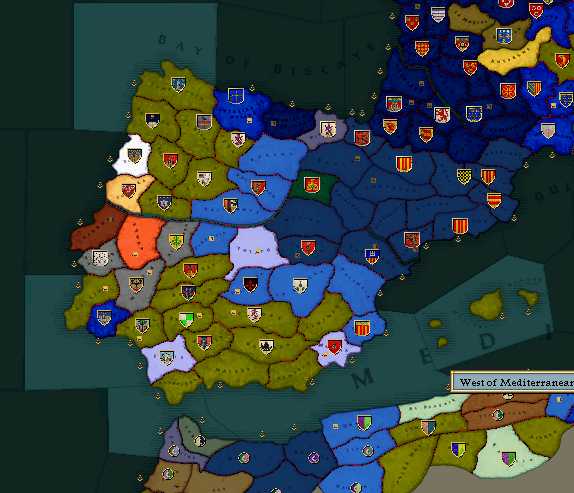
In 1151, Bolko's daughter Elzbieta married the son of the duke of Benevento, and Lambert married the sister of the count of Consenza in 1152. Lambert continued to quarral with his father, and his failure to become steward contributed to his ongoing depression. Bolko finally decided to focus on his sons. The mildly capable Leszek was made steward of the duchy, Wladislaw was married to the sister of the king of Naples, and the bastard Pawel was appointed as bishop of Menorca. In 1158, Alphonse became king of Naples and Bolko's brother Trojden married the king's sister. Campania's drift into the orbit of Naples did not constitute the only problem confronting the Holy Roman Empire; in 1159, Spain had become independent. Despite the turbulance of the decade, Bolko focused on salvation, building churches throughout his realm. Nearly all of his Muslim provinces had been converted to Catholicism.
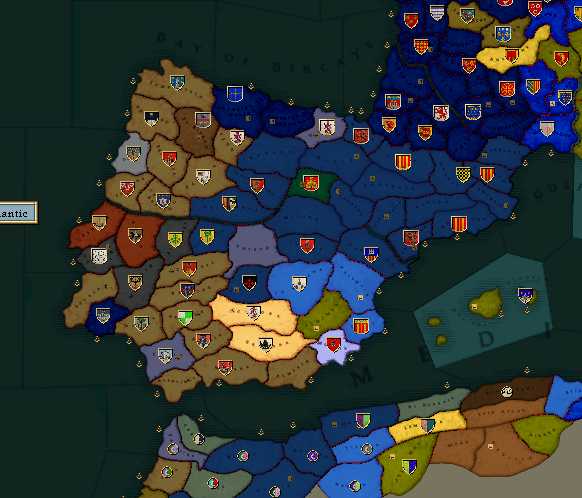
The Piasts and the de Hautevilles were very close by 1165, with Piast infants third and fourth line to inherit most of the kingdom of Naples. Bolko also focused on the city of Taranto, which was owned by the distant duke of Norfolk; he married his son Stanislaw to the duke's sister. The rehabilitation of his reputation was complete and he was known as a respectable duke by this time. The second half of the decade was dominated by war with Venice. The first army that Bolko raised was obliterated due to foolish decisions by the emperor. He reluncantly raised a second, and by 1166 he was constantly stressed. Jacek died the same year, and Trojden was chosen as his new heir. Miklós, also his brother, recovered the situation in Italy and became very popular with his soldiers, and his successes helped the emperor prevail by the end of year. Venice surrendered, along with most of its African possessions. Bolko got nothing. This lesson was not lost on Miklós.
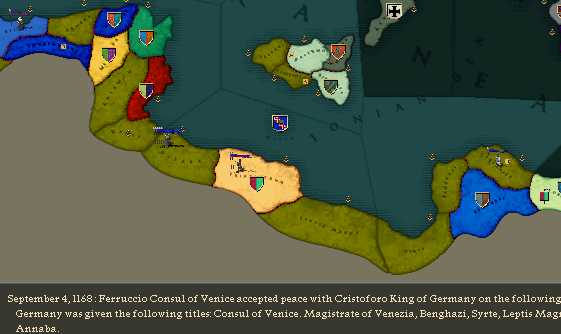
Miklós was rewarded for his accomplishments with a marriage to Anne de Vassy, the daughter of the duke of Norfolk. Bolko meanwhile had acquired enough prestige to credibly restake his claim to the kingdom of Poland. Lambert, sensing his opportunity slipping away, struggled to be declared marshal after his great-uncle Marshal Dytryk was gored by a boar, but Bolko continued to refuse his eldest son. When Trojden died in 1173, Bolko appointed Miklós as his heir; Lambert again tried to earn an office from his father and was joined in his demands by his brother Wladislaw. Bolko's continued refusal completed the rift. Lambert fled to the bishopric of Nice in 1146 and Wladislaw went into exile in Taranto the next year.
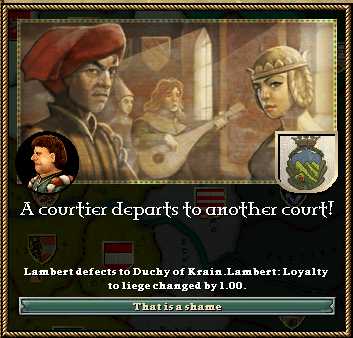
On April 23rd, 1177, Bolko passed away at the age of 64. The new duke, his brother Miklós, acknowledge that years of intermarriage had made Campania part of the kingdom of Naples. The crushing taxes imposed by the new emperor Rüdger contributed to his decision. Miklós reluctantly declared Bolko's only loyal and living son Leszek as his successor, and then looked north. He would carefully watch to see how Germany reacted to his move, and he was curious to see how István Bodzeta, the new king of the Poles, would govern his ancestor's kingdom.
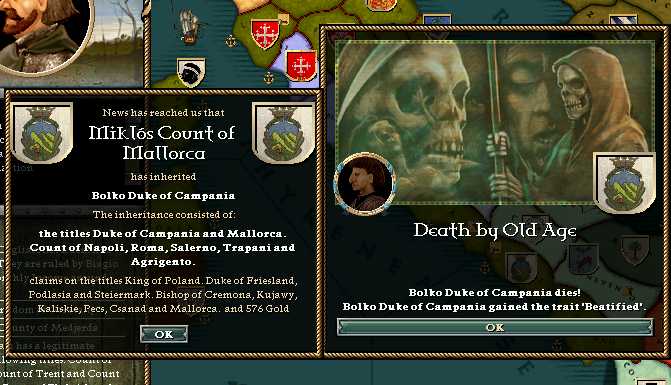
The Fall of the Kingdom of Poland
And the Fate of the House of Piast
And the Fate of the House of Piast
In 1131, Bolko had a tattered reputation and very little land. For two years, raising his son Lambert and the birth of his next two sons distracted him from affairs of state, but by 1133 he was ready to restore his fortunes. Claims were engineered against the independent counties of Napoli and Salerno, and by 1135 both provinces had been conquered. For his accomplishments, Bolko was made duke of Campania by the emperor.

Bolko relied heavily on his brothers during the early years of his reign. One brother, the selfish and arbitrary Jacek, encouraged Bolko to secure his position by purging all outsiders from the court. Between 1136 and 1140, a dozen courtiers were executed and Jacek was declared Bolko's heir. One courtier, the Prussian Betten of Marienburg, claimed Bolko fathered her son. She was killed and Pawel was adopted by the duke. The most significant event of this purge was the marriage between Jacek and the sister of the duke of Apulia. This union between the House of Piast and the de Hautevilles would prove important later on.

The purge weighed on Bolko's soul, and in 1141 he was called upon to atone for his crimes. He chose to purify himself through a crusade and sailed for Sicily in 1142. By September, he was eight hundred ducats in debt but had secured a landing at Trapani. The Muslim half of the island was conquered steadily and Jacek was dispatched to secure the conquest.

The union between Apulia and Campania continued to grow with the birth of Waclaw, third in line to become duke of Apulia. Bolko believed that God had forgiven him for his sins, and prosecuted his crusade with renewed zeal. Bishop Dobromir was sent to convert the Muslims of Agrigento, while Bolko himself sailed against the Hammadids in Sardinia. Neither venture proved successful; Trapani collapsed into anarchy in 1145, while Emperor Gerolamo usurped Bolko's conquests.

Not wanting his expedition west to be in vain, Bolko continued on to the Muslim islands of Mallorca and Menorca. Both islands were conquered within the year. Young Lambert accompanied his father on this crusade, but he failed to learn from Bolko's tough and determined example. Instead, Lambert developed a reputation as a violent and misguided warrior. Another son, Leszek, was rumored to have fathered a child with a servant and was ordered to confess his sins. Bolko continued to be vexed by his many sons.

The frustrated Dobromir rebelled in 1147 and was quickly crushed. Many of the Italian soldiers chose to stay in Sicily, and by 1149 Trapani had become majority Christian and Italian. This added to the triumph of barely a year before when the de Hautevilles proclaimed the Kingdom of Naples. Bolko was further pleased to hear news that Bolko Brochwicz, the dictator of Poland, had died some years past. The nobles had elected a German, Friedrich Askanien, to replace him. Despite being pulled in two directions by marriage and revenge, Bolko focused on his duties to the Holy Roman Empire. He watched with interest its success in Spain. By 1150, sailors from Campania were renowed for their merchant trips between Catholic Spain and Napoli.

In 1151, Bolko's daughter Elzbieta married the son of the duke of Benevento, and Lambert married the sister of the count of Consenza in 1152. Lambert continued to quarral with his father, and his failure to become steward contributed to his ongoing depression. Bolko finally decided to focus on his sons. The mildly capable Leszek was made steward of the duchy, Wladislaw was married to the sister of the king of Naples, and the bastard Pawel was appointed as bishop of Menorca. In 1158, Alphonse became king of Naples and Bolko's brother Trojden married the king's sister. Campania's drift into the orbit of Naples did not constitute the only problem confronting the Holy Roman Empire; in 1159, Spain had become independent. Despite the turbulance of the decade, Bolko focused on salvation, building churches throughout his realm. Nearly all of his Muslim provinces had been converted to Catholicism.

The Piasts and the de Hautevilles were very close by 1165, with Piast infants third and fourth line to inherit most of the kingdom of Naples. Bolko also focused on the city of Taranto, which was owned by the distant duke of Norfolk; he married his son Stanislaw to the duke's sister. The rehabilitation of his reputation was complete and he was known as a respectable duke by this time. The second half of the decade was dominated by war with Venice. The first army that Bolko raised was obliterated due to foolish decisions by the emperor. He reluncantly raised a second, and by 1166 he was constantly stressed. Jacek died the same year, and Trojden was chosen as his new heir. Miklós, also his brother, recovered the situation in Italy and became very popular with his soldiers, and his successes helped the emperor prevail by the end of year. Venice surrendered, along with most of its African possessions. Bolko got nothing. This lesson was not lost on Miklós.

Miklós was rewarded for his accomplishments with a marriage to Anne de Vassy, the daughter of the duke of Norfolk. Bolko meanwhile had acquired enough prestige to credibly restake his claim to the kingdom of Poland. Lambert, sensing his opportunity slipping away, struggled to be declared marshal after his great-uncle Marshal Dytryk was gored by a boar, but Bolko continued to refuse his eldest son. When Trojden died in 1173, Bolko appointed Miklós as his heir; Lambert again tried to earn an office from his father and was joined in his demands by his brother Wladislaw. Bolko's continued refusal completed the rift. Lambert fled to the bishopric of Nice in 1146 and Wladislaw went into exile in Taranto the next year.

On April 23rd, 1177, Bolko passed away at the age of 64. The new duke, his brother Miklós, acknowledge that years of intermarriage had made Campania part of the kingdom of Naples. The crushing taxes imposed by the new emperor Rüdger contributed to his decision. Miklós reluctantly declared Bolko's only loyal and living son Leszek as his successor, and then looked north. He would carefully watch to see how Germany reacted to his move, and he was curious to see how István Bodzeta, the new king of the Poles, would govern his ancestor's kingdom.

Last edited:
Birth of a new Piast kingdom.
Already an old man of 52 when he inherited, Miklós was known as a forgiving and just ruler who was lazy but zealous. His religious passions came to dominate his decade in power due to an unlikely alliance with Gualtiero, the count of Cagliari. Gualtiero's lands in Sardinia had been seized by the emperor, so when Miklós offered to send soldiers to Gualtiero's African province of Lemdiyya in return for Cagliari, he agreed. By 1178, a fleet was sailing from Rome to once again bring war to the Hammadids.
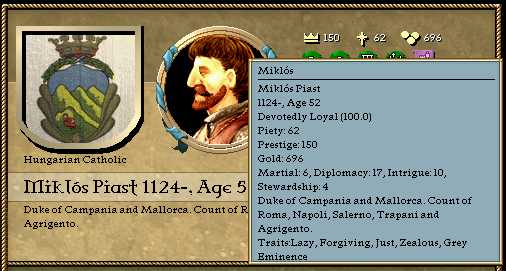
The Hammadids were already a defeated power when Miklós arrived with his army. The landing party killed a dozen Moors for every one of their own number who fell. By July 1179, the kingdom had been conquered, but Lemdiyya was lost to Germany and Gualtiero was in exile. Guilt at the defeat of his ally may have contributed to Miklós sending money to offset a bad year at the fishery in Cagliari.
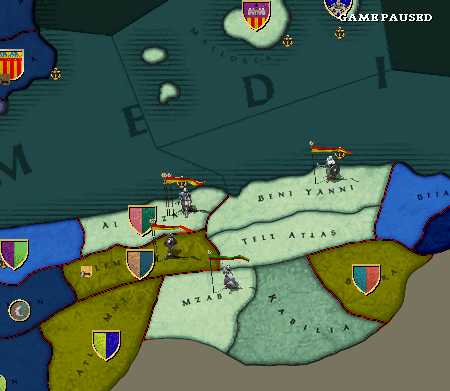
The next year saw the fleets of Campania setting sail once again, this time heading for the Muslim kingdom of Zenata. The fleet landed just before Christmas of 1180 and began their assault in the spring, but the victory at Snassen was costly and reinforcements were called in from Rome. By the middle of 1181, the invasion resumed as Christian warriors led by Miklós swept into Hanyan.
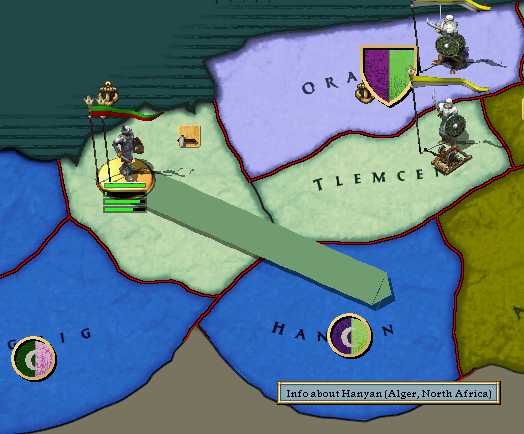
Miklós' success encouraged Roger, the count of Orania, to pledge fealty to the duchy. Roger was given protection from the Moors and was allowed to join the crusade. In return, he gave up the province of Bejaija. Miklós gave the newly-conquered province of Beni Yanni to Konrad to indicate that the son of Leszek was still his chosen successor. The alliance successfully crushed Zenata by June 1182, but Campania was deeply in debt. Miklós decided to focus on paying off his debts and restructuring his realm, which had grown too large for one man to manage. Borzyslaw Kristopolos was invested as bishop of Cagliari, Stanislaw (son of Lambert) was made count of Agrigento, Henryk was made count of Salerno, and Stanislaw's son Mieszko was made count of Trapani. Konrad was once again given land, this time the province of Bejaija.
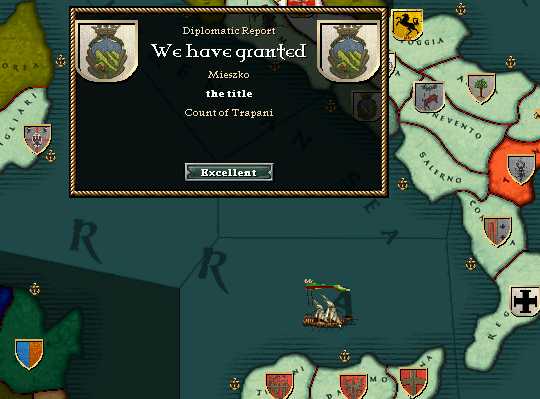
The kingdom of Poland continued to prosper during this time. A war against the Pagan Cumans was a huge success, doubling the size of the realm. Another king, Pál of Hungary, made contact with Miklós for the purpose of marrying his son János to Stanislaw's daughter Anastazja. Miklós agreed.

Relations with the de Hauteville family soured as King Alphonse of Naples turned out to be a cruel, selfish, and deceitful ruler whose arbitrary decisions pleased nobody. Miklós had a new focus however, and worked to earn the trust of his Moorish subjects through force and kindness. Peasants were converted in Snassen and taxes were lowered throughout other provinces. His just rule earned him the title of duke of El Rif and Constantine. By 1185, Campania was free of debt and a new army was raised for a third crusade against the Moors.
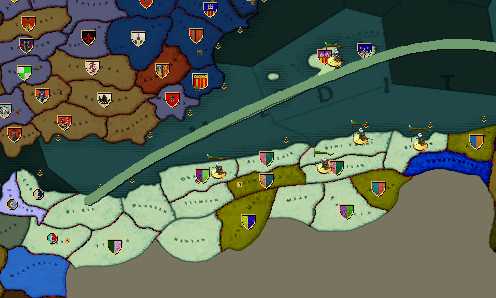
Cebta and Tangiers fell in 1186. After reinforcements arrived from Italy, Fes was captured in 1187 and Miklós contrinued down the coast to Infa. Although Moorish revolts swept through north Africa, the pope and the emperor seemed to compete to reward Miklós for his crusade. He became duke of Tangiers one year and duke of Fes the next. In July 1187, his army wiped out a band of 500 Muslim warriors without suffering a single casualty and moved on to Massat. The rebellion faltered but Miklós was merciful, and ordered food to be sent to the starving Muslim cities in El Rif. At Massat, a general was badly wounded, but this news was overshadowed by the death of Miklós Piast, who finally succumbed to old age.
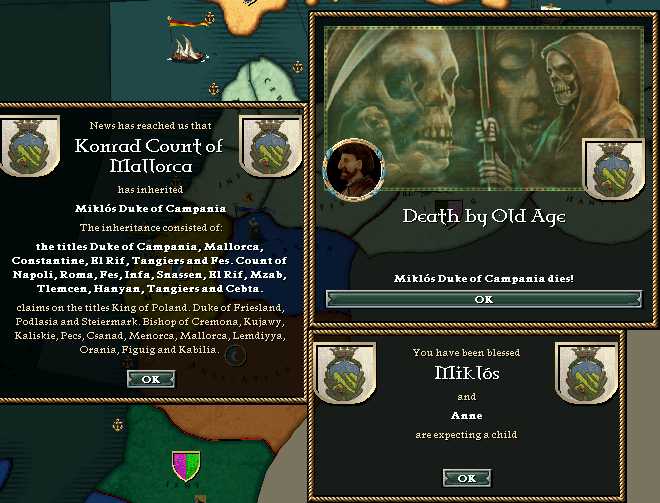
Konrad Piast was proclaimed duke on the battlefield and resumed the assault against the Muslims. He was already known as a forgiving and just ruler, and he chose to permit Muslims throughout the region to practice their religion in peace.
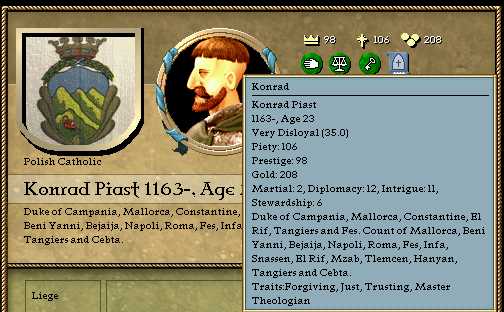
The siege at Massat continued into 1188. The Italian general Luigi Goudeles was captured by the enemy. Konrad chose to pay his ransom and moved to finish his enemy once and for all. As the Muslim army fled the field of battle, Konrad rode his horse forward and was shot by a fleeing archer. He fell and died after less than two months in power.
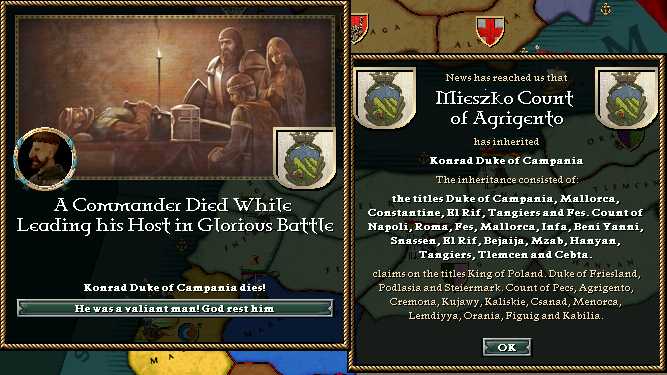
Massat fell within a week of Konrad's death. The many counts of Campania elected Mieszko, the fifteen-year-old son of the late Stanislaw, to succeed the duke. Although not yet a man, the great-grandson of Bolko Piast was known as a zealous yet forgiving warrior. Mieszko's great-great-great-great-grandfather had been king of Poland. In January 1188, the House of Piast once again ruled a kingdom as Mieszko was crowned king of Mauretania. A crusader kingdom was born.
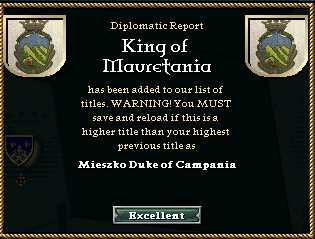
The Fall of the Kingdom of Poland
And the Fate of the House of Piast
And the Fate of the House of Piast
Already an old man of 52 when he inherited, Miklós was known as a forgiving and just ruler who was lazy but zealous. His religious passions came to dominate his decade in power due to an unlikely alliance with Gualtiero, the count of Cagliari. Gualtiero's lands in Sardinia had been seized by the emperor, so when Miklós offered to send soldiers to Gualtiero's African province of Lemdiyya in return for Cagliari, he agreed. By 1178, a fleet was sailing from Rome to once again bring war to the Hammadids.

The Hammadids were already a defeated power when Miklós arrived with his army. The landing party killed a dozen Moors for every one of their own number who fell. By July 1179, the kingdom had been conquered, but Lemdiyya was lost to Germany and Gualtiero was in exile. Guilt at the defeat of his ally may have contributed to Miklós sending money to offset a bad year at the fishery in Cagliari.

The next year saw the fleets of Campania setting sail once again, this time heading for the Muslim kingdom of Zenata. The fleet landed just before Christmas of 1180 and began their assault in the spring, but the victory at Snassen was costly and reinforcements were called in from Rome. By the middle of 1181, the invasion resumed as Christian warriors led by Miklós swept into Hanyan.

Miklós' success encouraged Roger, the count of Orania, to pledge fealty to the duchy. Roger was given protection from the Moors and was allowed to join the crusade. In return, he gave up the province of Bejaija. Miklós gave the newly-conquered province of Beni Yanni to Konrad to indicate that the son of Leszek was still his chosen successor. The alliance successfully crushed Zenata by June 1182, but Campania was deeply in debt. Miklós decided to focus on paying off his debts and restructuring his realm, which had grown too large for one man to manage. Borzyslaw Kristopolos was invested as bishop of Cagliari, Stanislaw (son of Lambert) was made count of Agrigento, Henryk was made count of Salerno, and Stanislaw's son Mieszko was made count of Trapani. Konrad was once again given land, this time the province of Bejaija.

The kingdom of Poland continued to prosper during this time. A war against the Pagan Cumans was a huge success, doubling the size of the realm. Another king, Pál of Hungary, made contact with Miklós for the purpose of marrying his son János to Stanislaw's daughter Anastazja. Miklós agreed.

Relations with the de Hauteville family soured as King Alphonse of Naples turned out to be a cruel, selfish, and deceitful ruler whose arbitrary decisions pleased nobody. Miklós had a new focus however, and worked to earn the trust of his Moorish subjects through force and kindness. Peasants were converted in Snassen and taxes were lowered throughout other provinces. His just rule earned him the title of duke of El Rif and Constantine. By 1185, Campania was free of debt and a new army was raised for a third crusade against the Moors.

Cebta and Tangiers fell in 1186. After reinforcements arrived from Italy, Fes was captured in 1187 and Miklós contrinued down the coast to Infa. Although Moorish revolts swept through north Africa, the pope and the emperor seemed to compete to reward Miklós for his crusade. He became duke of Tangiers one year and duke of Fes the next. In July 1187, his army wiped out a band of 500 Muslim warriors without suffering a single casualty and moved on to Massat. The rebellion faltered but Miklós was merciful, and ordered food to be sent to the starving Muslim cities in El Rif. At Massat, a general was badly wounded, but this news was overshadowed by the death of Miklós Piast, who finally succumbed to old age.

Konrad Piast was proclaimed duke on the battlefield and resumed the assault against the Muslims. He was already known as a forgiving and just ruler, and he chose to permit Muslims throughout the region to practice their religion in peace.

The siege at Massat continued into 1188. The Italian general Luigi Goudeles was captured by the enemy. Konrad chose to pay his ransom and moved to finish his enemy once and for all. As the Muslim army fled the field of battle, Konrad rode his horse forward and was shot by a fleeing archer. He fell and died after less than two months in power.

Massat fell within a week of Konrad's death. The many counts of Campania elected Mieszko, the fifteen-year-old son of the late Stanislaw, to succeed the duke. Although not yet a man, the great-grandson of Bolko Piast was known as a zealous yet forgiving warrior. Mieszko's great-great-great-great-grandfather had been king of Poland. In January 1188, the House of Piast once again ruled a kingdom as Mieszko was crowned king of Mauretania. A crusader kingdom was born.

Last edited:
Wow, a lot happened here. Maybe too much at one go. Maybe time to stabilize and consolidate.
Indeed, hardly time to pause and catch breath! A space for sorting things out is needed I think.
Is this going too fast to be interesting? With one update per leader, a lot of ground is going to get covered each time. Although our Mieszko does spend time consolidating his empire, as you'll see in the next update.
From strength to madness.
Mieszko was young but was up to the task of ruling his large realm. Guillaume, son of Miklós, was made duke of Constantine. The islands of Mallorca were given to Knut de Thous, now an archbishop. Henryk, a nephew of Miklós, was made duke of Campania. With the east secured by his cousins, Mieszko focused on the crusade against the Moors. He invaded Anti-Atlas in February 1188. Mieszko famously accepted a tribute of 4,400 ducats from the Moors before breaking the truce days later to seize their land. He then eyed Al Djazair, the strip of land separating the two halves of his African kingdom. When he sent troops to conquer it, King Alphonse of Naples declared war.
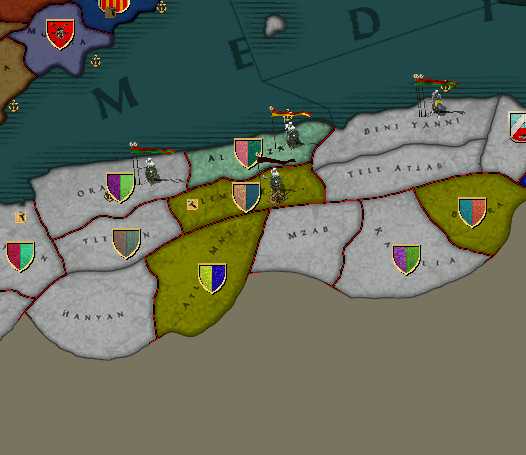
The young king started his war by forcing several tribes of Muslims to convert in Tangiers, and then moved east to Al Djazair. The Moor Malik Mansoor became famous for his bravery in the African campaign, and when Naples was routed at Capua the same day, the pope intervened to call for peace in Italy.
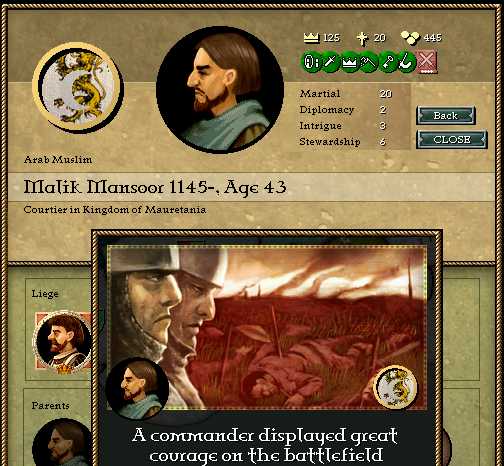
By April 1189 Al Djazair had fallen and Naples surrendered. Ziemoysl, son of Leszek, was made duke of Alger. Mieszko celebrated his victory by marrying Muriella of Armagnac and having thousands of Muslims in Infa converted. The king's advisors reported that Muriella was with a child a week later. The marriage, however, did not last long. A daughter, Konstancja, was born in December 1189, but Muriella died in childbirth two years later.

Mieszko was determined to keep his claim to the French county of Constantine alive, so he married Muriella's sister Fressenda. Meanwhile, Mieszko was proclaimed king of North Africa. One of his first duties was to preside over the trial of his cousin Eufemia who had been accused of witchcraft. She was found guilty and burned. Catholicism continued to creep into Africa, with mass conversions at Massat in 1192. A brief war broke out in 1193 when Guigues, count of Palermo, pledged fealty to Mauretania and soldiers from Trapani stormed Mesinna, but the years mostly passed quickly and quietly. During this time, Mieszko made sure to pay attention to happenings in Poland. Endre Bodzeta was king there and the Bodzeta family had become the kingdom's ruling dynasty.
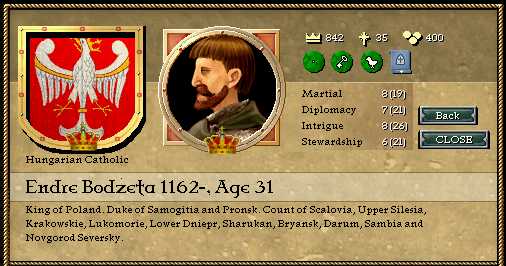
Germany remained embroiled in war with the Turks, and this struggle boiled over into Tunisia in 1194. Ealdred, count of Medjarda and Tunis, joined the kingdom to seek protection from the Turks, and Mieszko staged a great hunt to demonstrate the prowess of his warriors. When Pope Riccardo died, the new pope was friendly to Mieszko and encouraged him to join the crusade. The province of Mahdia was seized in 1195, provoking declarations of war from all over Asia.

Sultan Demir, however, proved to be a wise ruler. Faced with many enemies, he chose to accept Mieszko's offer of 500 ducats for the province. Peace lasted until 1197 when a crisis erupted over the county of Constantine. The duke of Armagnac had passed away, and his excommunicated son Herman was fighting a losing battle against the king of France. Mieszko did not want to see the French king sail a fleet to Africa, so he offered to made Herman's duchy part of Mauretania. Herman agreed, but to his dismay Mieszko forced him to give up Constantine. Within days, Herman had no choice but to surrender his lands and become a prisoner of the French crown.
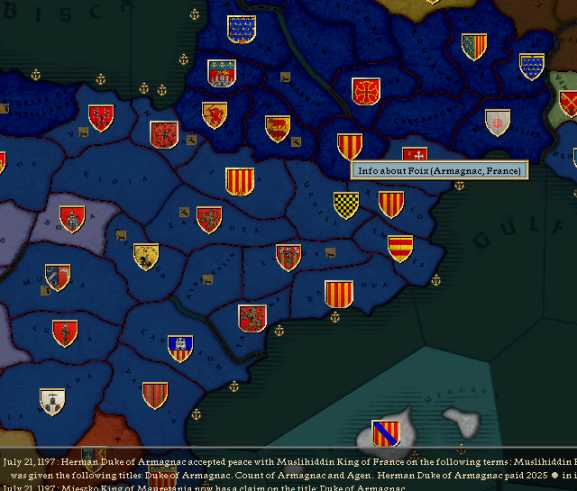
Later that same year, a complex web of alliances brought Mauretania into a war against the Kingdom of Aragon. Mieszko saw this as an opportunity to expand into the Spanish cities of the Moroccan coast. He assembled two armies, one to invade Morocco and the other to sail for Spain. Marrakech and Infa were seized, pushing Catalonia and the bishop of Bukhara out of the war and enriching Mieszko by 3,000 ducats. When Mieszko's brother Ziemoysl was proclaimed duke of Marrakech, Catalonia once again joined the conflict and lost Ifni for its efforts. Meanwhile, Henryk of Campania marched through southern France, defeating a Spanish army at Provence.
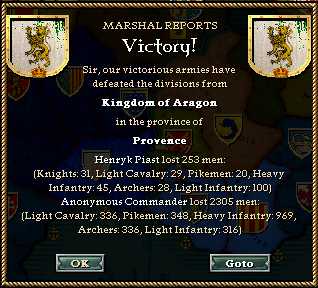
By February 1198, the war was basically over. Mieszko's army crushed Thassarat and sailed for Canarias, while Valencia and Catalonia offered tribute in return for peace. King Lope of Aragon was overthrown and abandoned, and Mieszko forced him to turn over the title of duke of Morocco to the archbishop of Mallorca. The new king of Aragon paid a large tribute and the two kingdoms were once again at peace.
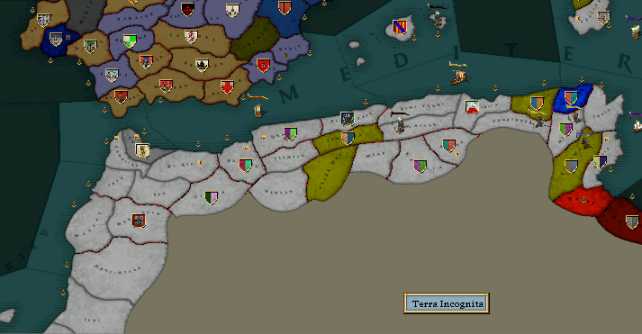
Mieszko's kingdom was finally secure save for a handful of German cities in North Africa. The question of how to deal with these cities plagued him, as he could not hope to defeat the Holy Roman Empire. Mieszko focused instead on charity and reconciliation with his Muslim subjects. Papal indulgences were given to the poor and the hero Malik Mansoor was made marshal of Mauretania. Mieszko was finally blessed with a son in April 1200 with the birth of Henryk, but he grew more and more stressed. Even the tournament triumph of Malik, who was feverish and ill during the combat, did not improve his disposition.
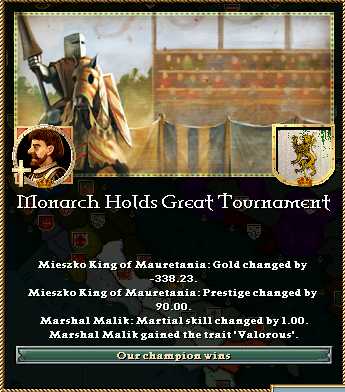
A great famine swept through the rebellious province of El Rif in December, and Mieszko ordered his steward to have food sent to the peasants. Sixteen days later, Mieszko killed himself with poison. With no clear successor, the door was open for Guillame, the mad son of Miklós, to assume the throne.
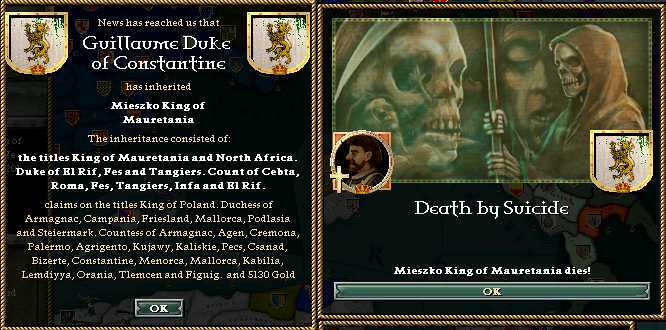
The Fall of the Kingdom of Poland
And the Fate of the House of Piast
And the Fate of the House of Piast
Mieszko was young but was up to the task of ruling his large realm. Guillaume, son of Miklós, was made duke of Constantine. The islands of Mallorca were given to Knut de Thous, now an archbishop. Henryk, a nephew of Miklós, was made duke of Campania. With the east secured by his cousins, Mieszko focused on the crusade against the Moors. He invaded Anti-Atlas in February 1188. Mieszko famously accepted a tribute of 4,400 ducats from the Moors before breaking the truce days later to seize their land. He then eyed Al Djazair, the strip of land separating the two halves of his African kingdom. When he sent troops to conquer it, King Alphonse of Naples declared war.

The young king started his war by forcing several tribes of Muslims to convert in Tangiers, and then moved east to Al Djazair. The Moor Malik Mansoor became famous for his bravery in the African campaign, and when Naples was routed at Capua the same day, the pope intervened to call for peace in Italy.

By April 1189 Al Djazair had fallen and Naples surrendered. Ziemoysl, son of Leszek, was made duke of Alger. Mieszko celebrated his victory by marrying Muriella of Armagnac and having thousands of Muslims in Infa converted. The king's advisors reported that Muriella was with a child a week later. The marriage, however, did not last long. A daughter, Konstancja, was born in December 1189, but Muriella died in childbirth two years later.

Mieszko was determined to keep his claim to the French county of Constantine alive, so he married Muriella's sister Fressenda. Meanwhile, Mieszko was proclaimed king of North Africa. One of his first duties was to preside over the trial of his cousin Eufemia who had been accused of witchcraft. She was found guilty and burned. Catholicism continued to creep into Africa, with mass conversions at Massat in 1192. A brief war broke out in 1193 when Guigues, count of Palermo, pledged fealty to Mauretania and soldiers from Trapani stormed Mesinna, but the years mostly passed quickly and quietly. During this time, Mieszko made sure to pay attention to happenings in Poland. Endre Bodzeta was king there and the Bodzeta family had become the kingdom's ruling dynasty.

Germany remained embroiled in war with the Turks, and this struggle boiled over into Tunisia in 1194. Ealdred, count of Medjarda and Tunis, joined the kingdom to seek protection from the Turks, and Mieszko staged a great hunt to demonstrate the prowess of his warriors. When Pope Riccardo died, the new pope was friendly to Mieszko and encouraged him to join the crusade. The province of Mahdia was seized in 1195, provoking declarations of war from all over Asia.

Sultan Demir, however, proved to be a wise ruler. Faced with many enemies, he chose to accept Mieszko's offer of 500 ducats for the province. Peace lasted until 1197 when a crisis erupted over the county of Constantine. The duke of Armagnac had passed away, and his excommunicated son Herman was fighting a losing battle against the king of France. Mieszko did not want to see the French king sail a fleet to Africa, so he offered to made Herman's duchy part of Mauretania. Herman agreed, but to his dismay Mieszko forced him to give up Constantine. Within days, Herman had no choice but to surrender his lands and become a prisoner of the French crown.

Later that same year, a complex web of alliances brought Mauretania into a war against the Kingdom of Aragon. Mieszko saw this as an opportunity to expand into the Spanish cities of the Moroccan coast. He assembled two armies, one to invade Morocco and the other to sail for Spain. Marrakech and Infa were seized, pushing Catalonia and the bishop of Bukhara out of the war and enriching Mieszko by 3,000 ducats. When Mieszko's brother Ziemoysl was proclaimed duke of Marrakech, Catalonia once again joined the conflict and lost Ifni for its efforts. Meanwhile, Henryk of Campania marched through southern France, defeating a Spanish army at Provence.

By February 1198, the war was basically over. Mieszko's army crushed Thassarat and sailed for Canarias, while Valencia and Catalonia offered tribute in return for peace. King Lope of Aragon was overthrown and abandoned, and Mieszko forced him to turn over the title of duke of Morocco to the archbishop of Mallorca. The new king of Aragon paid a large tribute and the two kingdoms were once again at peace.

Mieszko's kingdom was finally secure save for a handful of German cities in North Africa. The question of how to deal with these cities plagued him, as he could not hope to defeat the Holy Roman Empire. Mieszko focused instead on charity and reconciliation with his Muslim subjects. Papal indulgences were given to the poor and the hero Malik Mansoor was made marshal of Mauretania. Mieszko was finally blessed with a son in April 1200 with the birth of Henryk, but he grew more and more stressed. Even the tournament triumph of Malik, who was feverish and ill during the combat, did not improve his disposition.

A great famine swept through the rebellious province of El Rif in December, and Mieszko ordered his steward to have food sent to the peasants. Sixteen days later, Mieszko killed himself with poison. With no clear successor, the door was open for Guillame, the mad son of Miklós, to assume the throne.

Last edited:
Nice update again. As for the pace, it's fine with me, I was just referring to all the events that happened in one update.
It's not too much for me as a reader, but maybe to much for a medieval monarch...
It's not too much for me as a reader, but maybe to much for a medieval monarch...
Oh boy, a mad king.
I just had a mad ruler myself for over 16 years, you are possible in big trouble
I just had a mad ruler myself for over 16 years, you are possible in big trouble
You're definitely moving fast with this one. Very different to your Knud AAR but still very well presented.
So the way back to Poland is via Mauretania. Interesting twist. But now with a mad king, you're gonna have problems.
If I could make one suggestion: when showing maps, perhaps you should hide soldiers. That way the fog of war is lifted and the pictures aren't so dark.
So the way back to Poland is via Mauretania. Interesting twist. But now with a mad king, you're gonna have problems.
If I could make one suggestion: when showing maps, perhaps you should hide soldiers. That way the fog of war is lifted and the pictures aren't so dark.
That is quite some marshall.
The real question now is, will the madness breed true?
The real question now is, will the madness breed true?
Good writing. When I saw this one back when it began, I thought (in a display of lack of modesty): "Mmmh, I may have started a trend for Poliand AARs", since there appeared two other Polish AARs in short succession after mine.
But now I see it's far from a plain Poland AAR. It's... interesting, to say the least.
And good writing. Have I already mentioned that?
But now, please leave that African soil and bring those Piasts home, bring 'em home.
But now I see it's far from a plain Poland AAR. It's... interesting, to say the least.
And good writing. Have I already mentioned that?
But now, please leave that African soil and bring those Piasts home, bring 'em home.
Wow, those Piasts sure seem to get around, don't they? Maybe in this TL, it'll be one of them who discovers America. Great set of updates there.
A mad king kills himself.
As the son of the great king Miklós, Guillaume, was well-regarded by his vassals despite having murdered his wife and son. His ascension in the year 1201 could have marked a turning point in the fortunes of Mauretania, but his virtuous nature was generally stronger than his madness. One of his first acts was to designate his competent and popular first cousin Henryk as his successor.
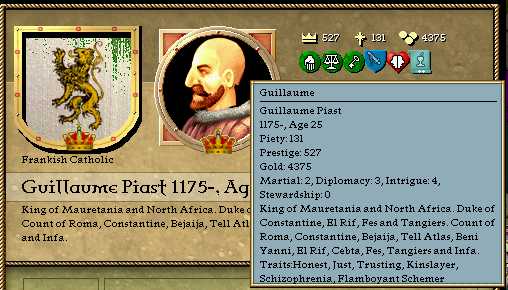
Malik Mansoor continued to capture the imagination of Africa's Christians. The great warrior became ill after his tournament victory, but recovered in 1202 and continued to serve Gauillame. The king even considered giving the Muslim land and titles, but chose to retain Malik as his personal champion instead. Despite Malik's advancing age, he remained one of the most famous and formidable warriors in the known world.
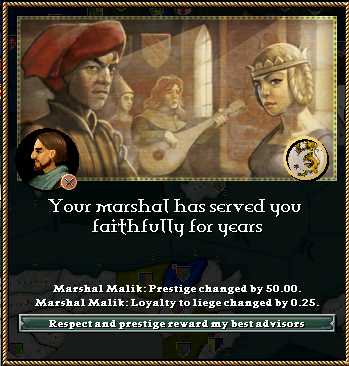
One of the most remarkable achievements of Guillaume's brief reign was concluding years of diplomacy by successfully bringing the duchy of Leptis Magna into his kingdom. Duke Firuz pledged his realm to Guillaume in 1203, making the king one of the most successful at expanding his realm's borders.
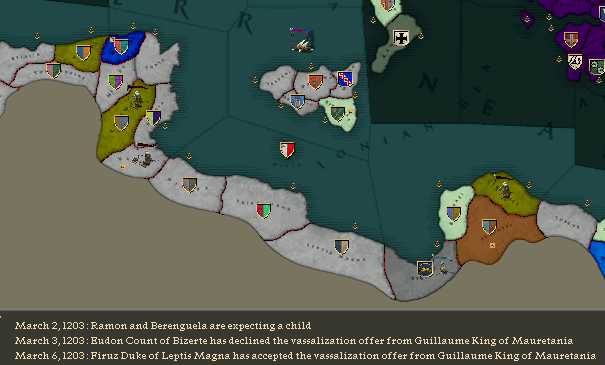
Following the expansion down the coast, Konrad son of Konrad was given the duchy of Kairouan, although Malik Mansoor was considered for the post. This expanded the power of the Piasts even further across Africa. Eudon, the count of Bizerte, was given one final chance to submit to Guillaume in April 1203, but he refused. Konrad was ordered to invade, and the tiny province fell quickly.
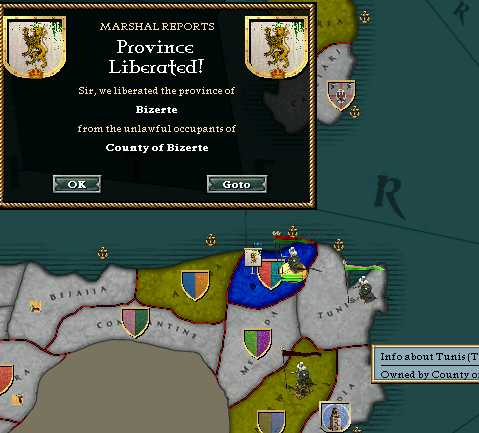
After the conquest, a man with the mysterious name of Charles Abdullah was made archbishop of Tunisia. The first job of this priest was to crown Guillaume king of Tunisia.
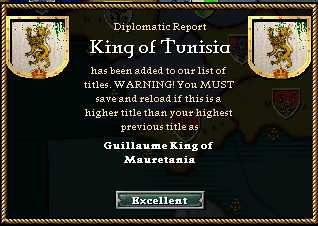
Over the next few months, the borders of the kingdom continued to creep east. Senoussi joined in July and Benghazi a week later. This brought the borders of Mauretania right up to the fragmented kingdom of Egypt. Guillaume declared his intention to add Egypt to his kingdom, but he proved unable to stave off madness forever. In late August 1203, he strangled Archbishop Charles. The murder was witnessed by Kamala de Hauteville, a hand-maiden in his court, and the unfortunate woman suffered the same fate that had befallen the priest.
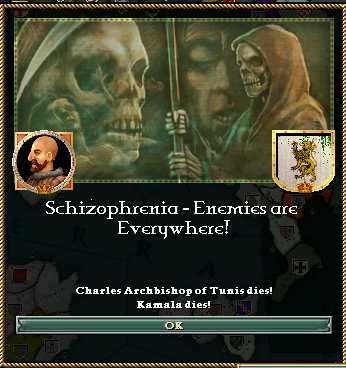
By January 1205, Guillaume was lost in his insanity. He came into conflict with Archbishop Landolfo over ownership of Morocco, and flew into a rage when Landolfo defied him. On February 16th, 1205, Guillaume was discovered dead. Although it was reported that he took his own life just as his predecessor had, several credible witnesses claimed the king had been murdered.
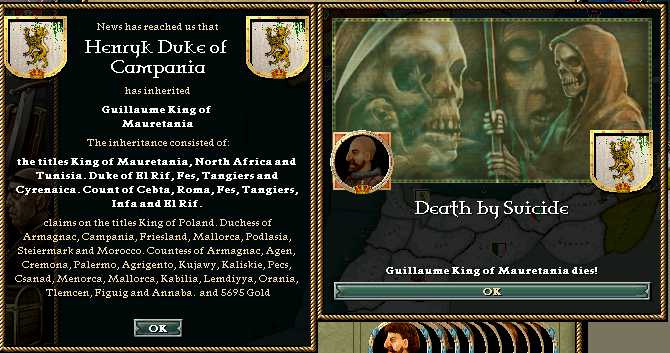
Despite Guillaume's madness, the nobles of Mauretania respected his wishes and elected Henryk Piast as their next king. Henryk had grown wealthy and powerful, and had many capable sons. He immediately began to consider which to promote as his heir. This raised the possiblity that the crown of Mauretania might pass, for the first time, from father to son.
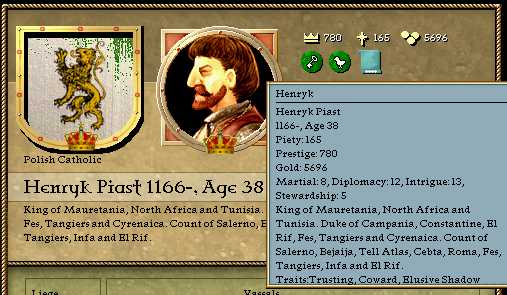
The Fall of the Kingdom of Poland
And the Fate of the House of Piast
And the Fate of the House of Piast
As the son of the great king Miklós, Guillaume, was well-regarded by his vassals despite having murdered his wife and son. His ascension in the year 1201 could have marked a turning point in the fortunes of Mauretania, but his virtuous nature was generally stronger than his madness. One of his first acts was to designate his competent and popular first cousin Henryk as his successor.

Malik Mansoor continued to capture the imagination of Africa's Christians. The great warrior became ill after his tournament victory, but recovered in 1202 and continued to serve Gauillame. The king even considered giving the Muslim land and titles, but chose to retain Malik as his personal champion instead. Despite Malik's advancing age, he remained one of the most famous and formidable warriors in the known world.

One of the most remarkable achievements of Guillaume's brief reign was concluding years of diplomacy by successfully bringing the duchy of Leptis Magna into his kingdom. Duke Firuz pledged his realm to Guillaume in 1203, making the king one of the most successful at expanding his realm's borders.

Following the expansion down the coast, Konrad son of Konrad was given the duchy of Kairouan, although Malik Mansoor was considered for the post. This expanded the power of the Piasts even further across Africa. Eudon, the count of Bizerte, was given one final chance to submit to Guillaume in April 1203, but he refused. Konrad was ordered to invade, and the tiny province fell quickly.

After the conquest, a man with the mysterious name of Charles Abdullah was made archbishop of Tunisia. The first job of this priest was to crown Guillaume king of Tunisia.

Over the next few months, the borders of the kingdom continued to creep east. Senoussi joined in July and Benghazi a week later. This brought the borders of Mauretania right up to the fragmented kingdom of Egypt. Guillaume declared his intention to add Egypt to his kingdom, but he proved unable to stave off madness forever. In late August 1203, he strangled Archbishop Charles. The murder was witnessed by Kamala de Hauteville, a hand-maiden in his court, and the unfortunate woman suffered the same fate that had befallen the priest.

By January 1205, Guillaume was lost in his insanity. He came into conflict with Archbishop Landolfo over ownership of Morocco, and flew into a rage when Landolfo defied him. On February 16th, 1205, Guillaume was discovered dead. Although it was reported that he took his own life just as his predecessor had, several credible witnesses claimed the king had been murdered.

Despite Guillaume's madness, the nobles of Mauretania respected his wishes and elected Henryk Piast as their next king. Henryk had grown wealthy and powerful, and had many capable sons. He immediately began to consider which to promote as his heir. This raised the possiblity that the crown of Mauretania might pass, for the first time, from father to son.

Last edited:

